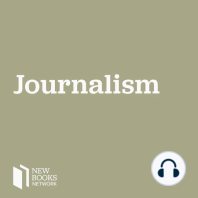52 min listen

Christopher Thaiss, "Writing Science in the Twenty-First Century" (Broadview Press, 2019)
Christopher Thaiss, "Writing Science in the Twenty-First Century" (Broadview Press, 2019)
ratings:
Length:
81 minutes
Released:
Apr 14, 2021
Format:
Podcast episode
Description
Listen to this interview of Christopher Thaiss, author of Writing Science in the Twenty-First Century (Broadview Press 2019). We talk about the research article, about writing styles, and about the uses of rhetoric to scientists.
Interviewer: "Too many students learning to write in the sciences lack helpful feedback on their writing, and this causes them to experience, quite personally, that disconnect we were talking about, between doing science and writing science."
Christopher Thaiss: "Feedback is one of the things I return to again and again in the book. And in my teaching, I think that one of the ways that feedback is used––I think that the most effective way that feedback is used is not so much the feedback that I give students about their writing, although the students will always say, 'We love your feedback!' But what's really important is the feedback that they learn to give and get in peer response workshops. I'm very careful in designing peer response so that students feel that sense of responsibility to give good feedback to one another, but also how to ask for feedback on the work that they're doing themselves. I think that peer response is so important in the scientific context, but it is, you know, in any writing context, and so I really try to foreground that within the course. The way I talk about it in writing in STEM is actually in the context of how research is done and how scientific discoveries and advancements are made: It's through the process of peer review. And if we can teach students early on to become good readers and then careful, conscientious givers of feedback to one another, we have achieved so much in terms of their ability to become contributing members of the scientific community."
Daniel Shea, heads Scholarly Communications, a Special Series on the New Books Network. Daniel is Director of the Heidelberg Writing Program, a division of the Language Center at Heidelberg University, Germany. Just write Daniel.Shea@zsl.uni-heidelberg.de
Learn more about your ad choices. Visit megaphone.fm/adchoices
Support our show by becoming a premium member! https://newbooksnetwork.supportingcast.fm/journalism
Interviewer: "Too many students learning to write in the sciences lack helpful feedback on their writing, and this causes them to experience, quite personally, that disconnect we were talking about, between doing science and writing science."
Christopher Thaiss: "Feedback is one of the things I return to again and again in the book. And in my teaching, I think that one of the ways that feedback is used––I think that the most effective way that feedback is used is not so much the feedback that I give students about their writing, although the students will always say, 'We love your feedback!' But what's really important is the feedback that they learn to give and get in peer response workshops. I'm very careful in designing peer response so that students feel that sense of responsibility to give good feedback to one another, but also how to ask for feedback on the work that they're doing themselves. I think that peer response is so important in the scientific context, but it is, you know, in any writing context, and so I really try to foreground that within the course. The way I talk about it in writing in STEM is actually in the context of how research is done and how scientific discoveries and advancements are made: It's through the process of peer review. And if we can teach students early on to become good readers and then careful, conscientious givers of feedback to one another, we have achieved so much in terms of their ability to become contributing members of the scientific community."
Daniel Shea, heads Scholarly Communications, a Special Series on the New Books Network. Daniel is Director of the Heidelberg Writing Program, a division of the Language Center at Heidelberg University, Germany. Just write Daniel.Shea@zsl.uni-heidelberg.de
Learn more about your ad choices. Visit megaphone.fm/adchoices
Support our show by becoming a premium member! https://newbooksnetwork.supportingcast.fm/journalism
Released:
Apr 14, 2021
Format:
Podcast episode
Titles in the series (100)
Thomas E. Patterson, “Informing the News: The Need for Knowledge-Based Journalism” (Vintage, 2013): Is truth in journalism the same as balance? Is fairness really fair to news consumers, or is fairness merely a code word used by journalists looking to get out of the line of fire? In his latest book, Informing the News: The Need for Knowledge-Based Jo... by New Books in Journalism